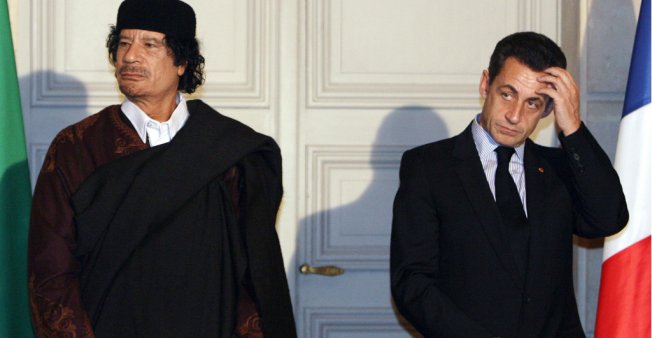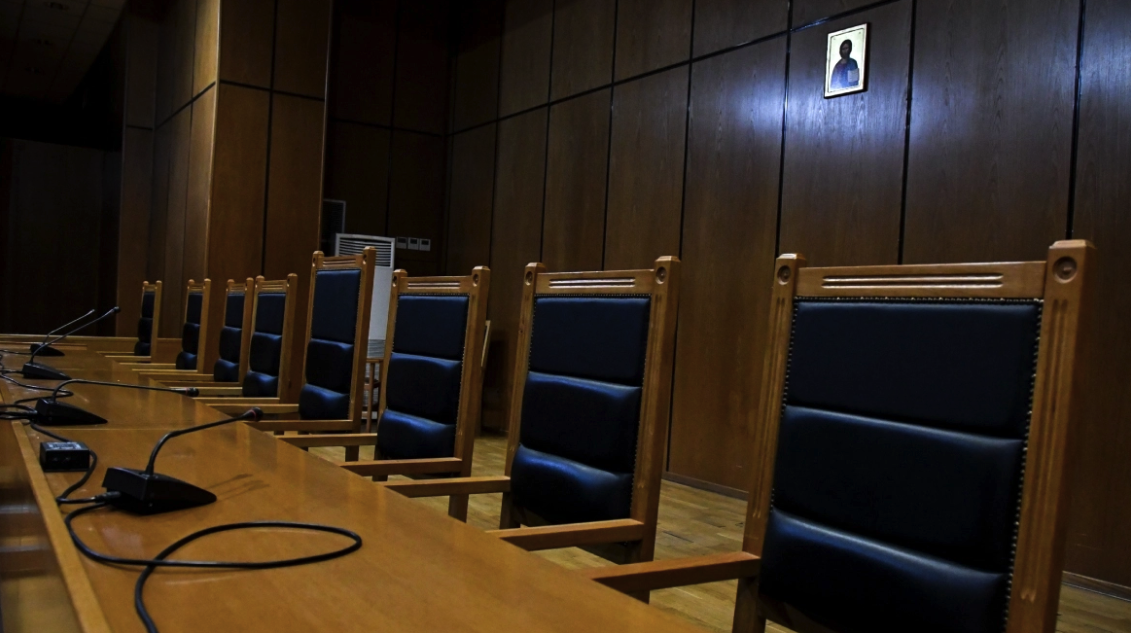Agents of France’s office for anticorruption and fiscal and financial infractions are questioning Sarkozy in the Paris suburb of Nanterre, where he has been detained since Tuesday morning. It is the first time authorities have questioned Sarkozy in connection with this dossier. They can keep the 63-year-old conservative former head of state in custody for up to 48 hours, after which he could be released without charge, placed under formal investigation or asked to reappear at a later date.
The case in a nutshell
The crux of the matter is whether Sarkozy’s winning 2007 presidential campaign received financing from Libya under the late dictator Muammar Gaddafi, whose son Saif al-Islam first made the allegation in 2011.
In 2012, the French investigative news website Médiapart published a document attributed to Moussa Koussa, Libya’s former chief of external intelligence, suggesting Sarkozy’s 2007 campaign had benefitted from Libyan funds to the tune of 50 million euros.
In April 2013, the Paris prosecutor’s office opened a general investigation for corruption, influence peddling, forgery and misuse of public funds over the allegations.
Days after the inquiry was opened, French satirical weekly Le Canard Enchaîné revealed the earlier discovery of an unreported 500,000-euro transfer to longtime Sarkozy associate Claude Guéant from a firm held by a Malaysian lawyer in March 2008. Guéant would explain the funds were payment for two 17th-century Dutch paintings, although French daily Le Monde noted the canvasses in question had previously been traded for far less. Investigators reportedly linked the transaction to a banker associated with Bashir Saleh, a Gaddafi money man, and French businessman Alexandre Djouhri, who is suspected of serving as an intermediary between Libya and Sarkozy’s team.
Guéant, who served as Sarkozy’s chief of staff when he was president, was charged in this case in 2015 with forgery, using forged documents, and laundering the proceeds of tax fraud in an organized group. Guéant had previously served as Sarkozy’s chief of staff when he was minister of the interior and, briefly, finance minister between 2002 and 2007 and was also Sarkozy’s 2007 presidential campaign director.
A number of Gaddafi-era Libyan officials are known to have made Sarkozy financing allegations. Investigating magistrates are known to have in their possession diaries belonging to Shukri Ghanem, Gaddafi’s Oil Minister, mentioning three payments in April 2007. Ghanem was found drowned in the Danube in Vienna in 2012.
In November 2016, French-Lebanese businessman Ziad Takieddine told Médiapart that he had served as a go-between delivering Libyan cash to then-Interior Minister Sarkozy and Guéant in Paris before the 2007 election. Takieddine claimed to have delivered suitcases stuffed with €5 million euros in 200- and 500-euro notes to the pair at the Interior Ministry, across the street from the Élysée Palace. The alleged intermediary said Abdullah Senussi, Gaddafi’s intelligence chief, had given Takieddine the cash during trips to Tripoli in late 2006 and 2007. Sarkozy and Guéant vehemently denied those allegations and sued Médiapart and Takieddine for defamation. French authorities laid corruption charges on Takieddine himself in the wake of that interview.
Takieddine is also under formal investigation in another, unrelated case involving illegal campaign financing in the 1995 French presidential election.
Latest developments
In September 2017, French anticorruption authorities published a report signaling a curiously high flow of cash among staff on the 2007 Sarkozy campaign. The campaign’s treasurer explained the euro bills as the fruit of anonymous donations, but statements obtained from other witnesses, including the staffer charged with opening campaign mail, are said to contradict that account.
In January of this year, Djouhri was arrested in London on a European arrest warrant issued by France “for offenses of fraud and money laundering” and later released on bail. The 59-year-old Frenchman, a Swiss resident, was incarcerated again at the end of February, before reportedly being hospitalized this month in London with heart trouble.
Sarkozy and Gaddafi, a complicated relationship
Soon after his election in May 2007, Sarkozy scored the diplomatic coup of helping free five Bulgarian nurses and a Palestinian doctor from a Libyan jail. The six medics had been convicted of deliberately infecting Libyan children with HIV and sentenced to death. Sarkozy had sent his soon-to-be ex-wife Cécilia and Chief of Staff Guéant to Libya to meet with Gaddafi in July 2007 and ultimately usher the medics out of Libya on a French state plane.
As president, Sarkozy rolled out the red carpet for Gaddafi early, famously allowing the eccentric autocrat to pitch his Bedouin tent on the grounds of the Hotel de Marigny, a state-owned mansion adjacent to the Élysée Palace, during a controversial five-day official visit to Paris in December 2007.
Relations evidently soured, however. In March 2011, after Gaddafi’s regime put down an insurrection in Benghazi, Sarkozy was the first foreign leader to recognize Libya’s rebel leadership as the country’s legitimate government. It was during the following week that Gaddafi’s son Saif al-Islam told foreign media outlets that Sarkozy would have to give the regime’s money back. “Sarkozy must return the money he accepted from Libya to finance his election campaign,” the junior Gaddafi told Euronews at the time.
The French president, meanwhile, was in the vanguard of advocacy for NATO-led air strikes in support of the rebellion that would ultimately end Gaddafi’s 42-year rule. The Libyan autocrat was killed in still-hazy circumstances in his hometown of Sirte in October 2011.
Busy lawyers
Sarkozy has already been ordered to stand trial over alleged illegal financing of his unsuccessful 2012 re-election campaign. In that case, the prosecution claims Sarkozy spent nearly double the €22.5-million legal limit for a French presidential bid, alleging his campaign falsified billing from a PR firm called Pygmalion. Sarkozy is appealing the decision to send him to trial.
The one-term president was cleared in October 2013 in another case alleging campaign financing impropriety ahead of the 2007 election. He had been accused of taking financial advantage of the frailty of the elderly L’Oréal heiress Liliane Bettencourt, France’s richest woman, who suffered from dementia.
In 2016, Sarkozy failed in his latest bid to win another term in the Élysée Palace when he lost the conservative Les Républicains nomination to François Fillon, his former prime minister. Sarkozy was eliminated after the first round of voting in France’s conservative primary, an open vote held five days after Médiapart published its interview with Takieddine about the suitcases full of cash.
As it happens, Fillon’s bid would falter under the weight of his own legal troubles, a fake jobs scandal that saw charges laid against Fillon and his wife Penelope in March 2017, just weeks before he finished a grim third in the presidential election’s first round.
Source: france24































